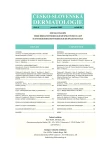Analysis of Causes of Rising Syphilis Incidence in the Prague Population
Authors:
I. Kuklová 1; P. Velčevský 1; M. Kojanová 1; V. Kaštánková 1; R. Trýzna 1; R. Pánková 1; K. Sedláková 1; J. Běláček 1,2
Authors‘ workplace:
Dermatovenerologická klinika 1. LF UK a VFN
přednosta prof. MUDr. Jiří Štork, CSc.
1; Ústav biofyziky a informatiky 1. LF UK
přednosta prof. MUDr. RNDr. Jiří Beneš, CSc.
2
Published in:
Čes-slov Derm, 84, 2009, No. 6, p. 350-355
Category:
Venereology
Overview
Clinical, epidemological and demographic data of syphilis patients hospitalized at the Dermatovenereology Clinic of the 1st Faculty of Medicine in Prague were evaluated and statistically significant gender differences were compared.
A total of 174 patients (59.8 % men and 40.2 % women) were hospitalized during the year 2008. 20.7 % of patients suffered from primary and 24.1 % of secondary syphilis. Heterosexual transmission remains the most common mode of transmission.
In the male group, the number of patients with homo/bisexual orientation has increased (47.1 % of all males hospitalized). They suffered from primary and secondary syphilis (p<0.001), were single (p<0.001) and reported a history of gonorrhoea more often; four men were HIV positive.
Most females were admitted for therapy during pregnancy (62.8 %), 24.3 % pregnant females were firstly admitted in relation to the prenatal screening; 37.1 % were admitted repeatedly for protective treatment. The patients’ age structure has not changed in the long term view, most patients were aged between 30 and 40. The percentage of foreigners is approximately the same as it was in the past (23 %), most of them coming from Ukraine. The number of foreigners is higher in the female group (p<0.001). From the epidemiologic point of view, the increase of manifest forms is significant, especially in the male group (65.4 %).
Key words:
syphilis – hospital records – epidemiology – risk groups
Sources
1. Brůčková, M. Infekce HIV a onemocnění AIDS. Referátový výběr z dermatovenerologie, 2009, 51, p.3-10.
2. CENTERS FOR DISEASE CONTROL. Sexually transmitted diseases treatment guidelines, 2006, MMWR Recomm Rep, 2006, 55, p.1-94.
3. Cowan S. Syphilis in Denmark – Outbreak among MSM in Copenhagen, 2003-2004, Euro Surveill, 2004, 9, p.25-7.
4. Cronin, M., Domegan, L., Thornton, L. et. al. The epidemiology of infectious syphilis in the Republic of Ireland. Euro Surveill, 2004, 9, p.14-7.
5. DIVIŠOVÁ, R., KUKLOVÁ, I.: Vyhodnocení souboru pacientů hospitalizovaných se syphilis acquisita. Čes-slov Derm, 2002, 77, p.56-60.
6. DUCHKOVÁ, H.: Současná legislativa venerických chorob. Čes Gynek, 1998, 63, p.
7. Fenton, KA., Imrie. J. Increasing rates of sexually transmitted diseases in homosexual men in Western Europe and the United States: Why? Infect Dis Clin North Am, 2005, 19, p.311–331.
8. Hopkins, S., Lyons, F., Coleman, C. et al. Resurgence in infectious syphilis in Ireland. Sex Transm Dis, 2004, 31(5), p.317-321.
9. Giuliani, M., Palamara, G., Latini, A., Maini, A., Aldo Di Carlo, A. Evidence of an outbreak of syphilis among men who have sex with men in RomeArch Dermatol, 2005, 141, p.100-101.
10. Křemenová, S. Sexuálně přenosné choroby – historie a současné problémy. In: Benáková, N (ed). Dermatovenerologie, dětská dermatologie a korektivní dermatologie 2006/2007. Praha, Triton, 2006, p.149-165.
11. KUKLOVÁ, I., Kojanová, M., Zákoucká, H., Pánková, R., Velčevský, P., Rozehnalová, Z., Hercogová, J. Dermatovenereology in the Post-Communist era: syphilis in Prague during 1999 to 2005. Dermatologic Clinics, 2008, 26, p.231–237.
12. Marcus, U., Hamouda, O., Kiehl, W. Reported incidence of gonorrhoea and syphilis in East and West Germany 1990-2000 – effects of reunification and behaviour change. Eurosurveillance Weekly 2001, 5, p.43.
13. Lacey, HB., Higgins, SP., Graham, D. An outbreak of early syphilis: cases from North Manchester General Hospital. Sex Transm Inf, 2001,77, p. 311-313.
14. Lynn, WA., Lightman, S. Syphilis and HIV: a dangerous combination. Lancet Inf Diseases, 2004, 4, p.456-466.
15. Pohlavní nemoci 2007, Praha: ÚZIS, 2008, p. 2-10.
16. Poulton, M., Dean, GL., Williams et al. Surfing with spirochaetes: an ongoing syphilis outbreak in Brighton. Sex Transm Inf, 2001,77, p.319-321.
17. Peterman, TA., Heffelfinger, JD., Swint, EB. et al. The changing epidemiology of syphilis. Sex Transm Dis, 2005, 32, p.S4 -S10.
18. Resl, V. Neúplné ohlédnutí za vývojem venerologie uplynulých 18 let. Referátový výběr z dermatovenerologie, 2009, 51, p.48-52.
19. ZÁKOUCKÁ, H.: Lymphogranuloma venereum. Referátový výběr z dermatovenerologie, 2009, 51, p.32-35.
Labels
Dermatology & STDs Paediatric dermatology & STDsArticle was published in
Czech-Slovak Dermatology

2009 Issue 6
-
All articles in this issue
- Analysis of Causes of Rising Syphilis Incidence in the Prague Population
- Sarcoidosis
- Contact Sensitivity to European Standard Series of Allergens
- Significance of Atopic Patch Test and Other Examination Methods in the Diagnosis of Peanut Allergy in Patients with Atopic Eczema Older than Fourteen Years. Significance of Pollen Allergy in This Patients’ Group
- Extraintestinal Form of Crohn’s Disease
- Czech-Slovak Dermatology
- Journal archive
- Current issue
- About the journal
Most read in this issue
- Sarcoidosis
- Extraintestinal Form of Crohn’s Disease
- Analysis of Causes of Rising Syphilis Incidence in the Prague Population
- Contact Sensitivity to European Standard Series of Allergens
